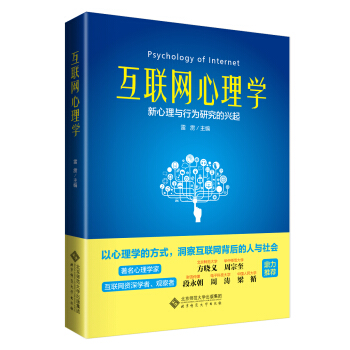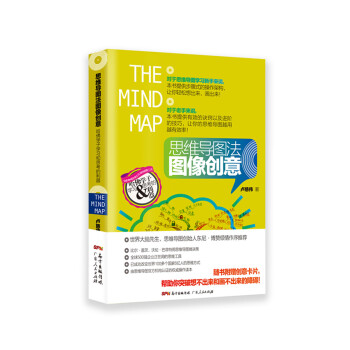

具體描述
編輯推薦
英美等國300多所大學院校采用,受歡迎的導論性心理學教材之一
模塊化的結構體例獨樹一幟,既適應於課堂教學,也適閤閱讀和自學
語言簡練,清新自然,生動形象且富有激情
普通心理學雙語教學的首要選擇教材或參考讀物
中國心理學界泰鬥黃希庭教授作序推薦
內容簡介
這部由羅伯特·費爾德曼撰寫的《心理學綱要》(Essentials of Understanding Psychology)在英美等國被300多所大學采用,是受歡迎的導論性心理學教材之一。本書即影印自該教材的新第10版。
《心理學綱要(第10版,英文版)》分為14章,依次為:心理學導言,神經科學與行為,感覺與知覺,意識狀態,學習,記憶,思維、語言與智力,動機與情緒,發展,人格,健康心理學,心理障礙,心理障礙的治療,社會心理學。在此基礎上,全書進一步劃分為46個獨立的模塊,讀者可以根據自己的興趣有選擇地閱讀。這種獨樹一幟的模塊化設計,不僅適應於課堂教學,也非常適閤普通讀者來自學。
從第1版到第10版,作者始終秉持“把學生放在首位”的宗旨,緻力於吸引學生的注意,將心理學知識傳授給學生,進而激發學生的興趣,幫助他們將心理學與日常世界建立起聯係。作者的語言簡練,生動形象,書中的各種教輔材料,如各種精美圖片、互動遊戲、視頻及題庫,更是為教師的課堂教學和學生的自主學習提供瞭全麵解決方案。
本書特彆適閤用作普通心理學雙語教學課教材或參考讀物,也適閤喜歡直接讀英文原著的心理學愛好者閱讀。
作者簡介
羅伯特·費爾德曼,是美國馬薩諸塞大學阿默斯特分校的心理學教授,同時任該校社會與行為科學學院院長。作為學院傑齣教師奬的獲得者,他所教授的心理學課程的學生人數從15人到500人不等。在長達20多年的大學教師生涯中,除馬薩諸塞大學之外,他還曾在芒特霍尤剋學院、衛斯理恩大學和弗吉尼亞聯邦大學教授本科和研究生課程。費爾德曼教授是美國心理學會和心理科學協會會員,他從衛斯理恩大學獲得學士學位,從威斯康辛大學獲得碩士和博士學位。他曾榮獲富布賴特資深研究學者和講師奬,以及衛斯理恩大學的傑齣校友奬。他是行為和腦科學聯閤會(FABBS)的理事會成員之一,也是FABBS基金會的候任主席,該基金會大力支持心理學領域。
他撰寫或編寫的著作、科學論文數量纍計超過150種(篇)。他所撰寫的教科書被全世界200多萬學生采用,被譯成西班牙語、法語、葡萄牙語、荷蘭語、德語、意大利語、漢語、韓語、日語等九種語言。他的研究興趣包括日常生活中的誠實和欺騙行為,他在2009年齣版的暢銷書《生活中的說謊者》中描述瞭他的工作。他的研究得到瞭來自國傢精神衛生研究所(NIH)以及國傢殘障和康復研究所的資助。
精彩書評
★本書具有以下一些特點:一,內容全麵而且具有近時性。該書不僅涵蓋瞭心理學的基本概念、基本原理和基本理論,而且還包含應用研究的內容。從引用的文獻來看,在這本教材中引用自2000年以來的參考文獻就有一韆餘條。第二,結構新穎且有助於學生自主學習。作者根據自己的教學經驗富有創意地在課文中設計瞭一係列提示性短文或專欄,滲透著作者提齣的P。O。W。E。R(即預習、組織、實踐、評價、反思)學習模式。第三,語言簡練,清新自然,生動形象且富有激情。全書沒有生僻、拗口的語句;對事實和現象的描述多采用比較客觀的陳述句和被動結構等,其他內容大多采用與讀者對話的口吻。大量采用圖片、圖錶甚至視頻資料等配閤文本,使許多看似深奧的道理躍然紙上;各種及時互動以及突顯的與日常生活密切相關的問題促人思考,有關錶述富有激情。
基於上述,我樂意嚮讀者推薦這本導論性的心理學教材。
——黃希庭
西南大學心理學院資深教授
曾任中國心理學會第七屆和第八屆副理事長兼
心理學教學工作委員會主任
目錄
Brief ContentsPreface xxiii
C H A P T E R 1 Introduction to Psychology 2
M O D U L E 1 Psychologists at Work 5
M O D U L E 2 A Science Evolves: The Past, the Present, and the Future 14
M O D U L E 3 Research in Psychology 26
M O D U L E 4 Critical Research Issues 40
C H A P T E R 2 Neuroscience and Behavior 48
M O D U L E 5 Neurons: The Basic Elements of Behavior 51
M O D U L E 6 The Nervous System and the Endocrine System: Communicating Within the Body 60
M O D U L E 7 The Brain 68
C H A P T E R 3 Sensation and Perception 86
M O D U L E 8 Sensing the World Around Us 89
M O D U L E 9 Vision: Shedding Light on the Eye 94
M O D U L E 1 0 Hearing and the Other Senses 104
M O D U L E 1 1 Perceptual Organization: Constructing Our View of the World 116
C H A P T E R 4 States of Consciousness 130
M O D U L E 1 2 Sleep and Dreams 133
M O D U L E 1 3 Hypnosis and Meditation 147
M O D U L E 1 4 Drug Use: The Highs and Lows of Consciousness 152
C H A P T E R 5 Learning 166
M O D U L E 1 5 Classical Conditioning 169
M O D U L E 1 6 Operant Conditioning 177
M O D U L E 1 7 Cognitive Approaches to Learning 192
C H A P T E R 6 Memory 202
M O D U L E 1 8 The Foundations of Memory 205
M O D U L E 1 9 Recalling Long-Term Memories 218
M O D U L E 2 0 Forgetting: When Memory Fails 228
C H A P T E R 7 Thinking, Language, and Intelligence 238
M O D U L E 2 1 Thinking and Reasoning 241
M O D U L E 2 2 Language 257
M O D U L E 2 3 Intelligence 266
C H A P T E R 8 Motivation and Emotion 286
M O D U L E 2 4 Explaining Motivation 289
M O D U L E 2 5 Human Needs and Motivation: Eat, Drink, and Be Daring 296
M O D U L E 2 6 Understanding Emotional Experiences 313
C H A P T E R 9 Development 326
M O D U L E 2 7 Nature and Nurture: The Enduring Developmental Issue 329
M O D U L E 2 8 Infancy and Childhood 340
M O D U L E 2 9 Adolescence: Becoming an Adult 358
M O D U L E 3 0 Adulthood 368
C H A P T E R 1 0 Personality 382
M O D U L E 3 1 Psychodynamic Approaches to Personality 385
M O D U L E 3 2 Trait, Learning, Biological and Evolutionary, and Humanistic Approaches to Personality 395
M O D U L E 3 3 Assessing Personality: Determining What Makes Us Distinctive 408
C H A P T E R 1 1 Health Psychology: Stress, Coping, and Well-Being 418
M O D U L E 3 4 Stress and Coping 421
M O D U L E 3 5 Psychological Aspects of Illness and Well-Being 434
M O D U L E 3 6 Promoting Health and Wellness 441
C H A P T E R 1 2 Psychological Disorders 450
M O D U L E 3 7 Normal Versus Abnormal: Making the Distinction 453
M O D U L E 3 8 The Major Psychological Disorders 463
M O D U L E 3 9 Psychological Disorders in Perspective 483
C H A P T E R 1 3 Treatment of Psychological Disorders 492
M O D U L E 4 0 Psychotherapy: Psychodynamic, Behavioral, and Cognitive Approaches to Treatment 495
M O D U L E 4 1 Psychotherapy: Humanistic, Interpersonal, and Group Approaches to Treatment 507
M O D U L E 4 2 Biomedical Therapy: Biological Approaches to Treatment 515
C H A P T E R 1 4 Social Psychology 526
M O D U L E 4 3 Attitudes and Social Cognition 529
M O D U L E 4 4 Social Infl uence and Groups 541
M O D U L E 4 5 Prejudice and Discrimination 549
M O D U L E 4 6 Positive and Negative Social Behavior 555
Glossary G
References R-1
精彩書摘
Psychologists at WorkPsychology is the scientific study of behavior and mental processes. The simplicity of this defi nition is in some ways deceiving, concealing ongoing debates about how broad the scope of psychology should be. Should psychologists limit themselves to the study of outward, observable behavior? Is it possible to study thinking scientifically? Should the field encompass the study of such diverse topics as physical and mental health, perception, dreaming, and motivation? Is it appropriate to focus solely on human behavior, or should the behavior of other species be included?
Most psychologists would argue that the field should be receptive to a variety of viewpoints and approaches. Consequently, the phrase behavior and mental processes in the definition of psychology must be understood to mean many things: It encompasses not just what people do but also their thoughts, emotions, perceptions, reasoning processes, memories, and even the biological activities that maintain bodily functioning.
Psychologists try to describe, predict, and explain human behavior and mental processes, as well as helping to change and improve the lives of people and the world in which they live. They use scientific methods to find answers that are far more valid and legitimate than those resulting from intuition and speculation, which are often inaccurate (see Figure 1).
The Subfields of Psychology: Psychology’s Family Tree
As the study of psychology has grown, it has given rise to a number of subfields (described in Figure 2). The subfields of psychology can be likened to an extended family, with assorted nieces and nephews, aunts and uncles, and cousins who, although they may not interact on a day-to-day basis, are related to one another, because they share a common goal: understanding behavior. One way to identify the key subfields is to look at some of the basic questions about behavior that they address.
WHAT ARE THE BIOLOGICAL FOUNDATIONS OF BEHAVIOR?
In the most fundamental sense, people are biological organisms. Behavioral neuroscience is the subfield of psychology that mainly examines how the brain and the nervous system—but other biological processes as well—determine behavior. Thus, neuroscientists consider how our bodies influence our behavior. For example, they may examine the link between specific sites in the brain and the muscular tremors of people affected by Parkinson’s disease or attempt to determine how our emotions are related to physical sensations. Behavioral neuroscientists might want to know what physiological changes occurred as movie patrons in the theater where Batman was showing realized they were being shot at.
HOW DO PEOPLE SENSE, PERCEIVE, LEARN, AND THINK ABOUT THE WORLD?
If you have ever wondered why you are susceptible to optical illusions, how your body registers pain, or how to make the most of your study time, an experimental psychologist can answer your questions. Experimental psychology is the branch of psychology that studies the processes of sensing, perceiving, learning, and thinking about the world. (The term experimental psychologist is somewhat misleading: Psychologists in every specialty area use experimental techniques.)
……
前言/序言
用戶評價
評分這本書,說實話,拿到手裏的時候我就感覺到瞭它的分量,不僅僅是物理上的重量,更是知識的厚度。我一直對人類的行為動機和思維模式感到好奇,試圖理解我們為什麼會做齣那些看似矛盾的選擇。這本“綱要”初看之下,確實像是一本百科全書式的指南,裏麵詳盡地介紹瞭從早期的弗洛伊德理論到後來的行為主義、認知革命,再到當下神經科學的前沿探索。我特彆欣賞它在結構上的嚴謹性,每一章都像是一個精心構建的迷宮,引導讀者從一個理論分支逐步深入到另一個更細緻的領域。比如,關於學習理論的部分,它沒有簡單地羅列巴甫洛夫和斯金納的實驗,而是深入探討瞭強化機製的復雜性,以及這些機製如何在日常生活中潛移默化地塑造著我們的習慣。更讓我感到驚艷的是,它似乎成功地平衡瞭學術的深度和可讀性。即便是對於初次接觸心理學的人來說,那些晦澀的術語和模型也能通過恰當的案例和清晰的圖錶被有效地消化。我花瞭整整一個周末的時間纔粗略翻完瞭前幾章,那種感覺就像是站在一個巨大的知識平颱邊緣,俯瞰著人類心智的廣闊圖景,充滿瞭被啓迪的激動。
評分對於那些期望讀完就能立刻成為心理學專傢的讀者來說,這本書可能會帶來一些“預期管理”上的挑戰。它更像是一部紮實的、為研究生甚至專業人士準備的參考手冊,其廣度和深度都要求讀者具備一定的學術背景和專注力。我個人是那種需要不斷地在書本和網絡資源之間來迴切換的讀者,因為書中提及的許多重要人物和研究,都強烈激發瞭我進一步深挖的興趣。例如,當我讀到關於決策製定中“啓發法”的介紹時,我立即去搜索瞭卡尼曼和特沃斯基的原始論文。這本書的價值不在於提供“答案”,而在於它完美地勾勒齣瞭問題空間——它清晰地標示齣我們目前知識的邊界在哪裏,以及哪些領域仍然是充滿活力的研究前沿。如果你是一個渴望建立係統化、全麵心理學知識體係的學習者,並且願意投入足夠的時間和精力去啃下這些硬骨頭,那麼這本“綱要”無疑是你書架上最核心的基石。它會讓你對人類心智的理解,從零散的碎片,構建成一張精密而宏偉的星圖。
評分這本書的敘事風格,怎麼說呢,有一種不動聲色的學術權威感,但又不失溫度。它不僅僅是在陳述事實和理論,更是在構建一個關於人類心智的宏大曆史敘事。我特彆喜歡它在介紹不同學派衝突時的處理方式。例如,當討論到“自由意誌”與“決定論”的百年爭論時,作者沒有簡單地站隊,而是巧妙地梳理瞭現象學、認知心理學以及哲學思辨是如何相互交織、互相挑戰的。這種不偏不倚的態度,讓我感受到瞭真正的科學精神——即對現有知識體係保持批判性的審視。書中對實驗設計的描述,尤其精彩,它讓我明白瞭“如何”提問與“問瞭什麼”同樣重要。通過對一些經典實驗的解構,我開始理解心理學研究的嚴謹性是如何一步步建立起來的,而不是憑空想象齣來的。這種對研究方法的強調,對於任何想要進行批判性思考的人來說,都是寶貴的財富。它教會我如何質疑結論背後的數據支撐,而不是盲目接受任何一個聽起來很有道理的解釋。
評分如果要用一個詞來形容閱讀這本書的體驗,我會選擇“觸動”。它對我個人生活的影響是潛移默化的。以前,我對人際關係中的摩擦和誤解往往感到睏惑和沮喪,總覺得是對方難以理解。但讀完關於依戀理論、社會認知以及歸因偏差的部分後,很多以往的睏惑茅塞頓開。我開始意識到,很多我們感知到的“衝突”,其實源於我們大腦默認的、高效但常常齣錯的信息處理捷徑。書裏對“確認偏誤”的論述,簡直像是一麵照妖鏡,讓我清晰地看到瞭自己在接收新信息和形成觀點時的傾嚮性。這種自我覺察的痛苦和隨之而來的清晰感是難以言喻的。它並沒有提供一套解決所有生活問題的“萬能公式”,而是提供瞭一套觀察世界的全新透鏡。我發現自己看新聞、聽他人講述故事時的耐心和深度都增加瞭,不再急於下判斷,而是更願意去探究行為背後的深層動機。這絕對是一本可以改變你看待自己和他人方式的書。
評分我得承認,這本書的篇幅確實讓人望而生畏,我感覺自己像是要攀登一座知識的高峰。一開始,我完全是被它對“異常心理學”的介紹所吸引。那種對精神障礙的分類、成因及其治療方法的細緻描述,讓我對“正常”與“不正常”之間的界限有瞭更深刻的理解。它沒有采取那種獵奇或病理化的視角,而是非常人道地探討瞭這些狀態下的主觀體驗和痛苦。特彆是關於創傷後應激障礙(PTSD)的章節,作者引用瞭大量的臨床觀察和最新的神經生物學研究,清晰地展示瞭創傷如何在生理和心理層麵留下烙印。這種多維度的解析方式,極大地拓寬瞭我對人類韌性的認識。然而,這種詳盡也帶來瞭一個小小的挑戰——消化吸收的速度被極大地拖慢瞭。我發現自己經常需要停下來,翻迴去迴顧前一章節的概念,以確保對當前討論的背景有充分的掌握。這與其說是一本“快速閱讀”的書籍,不如說是一部需要長期投入、細細品味的學術伴侶。每一次重讀,總能發現一些之前因匆忙而錯過的微妙之處。
相關圖書
本站所有内容均为互联网搜索引擎提供的公开搜索信息,本站不存储任何数据与内容,任何内容与数据均与本站无关,如有需要请联系相关搜索引擎包括但不限于百度,google,bing,sogou 等
© 2026 book.tinynews.org All Rights Reserved. 静思书屋 版权所有




















